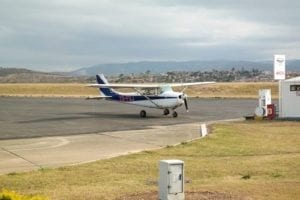This is especially evident in many airports across the continent, which are generally not up to par with international standards, with the exception of one or two airports, particularly South African airports. Air traffic services also show some decay in Africa.
The future of aviation is bright in Africa: the sector has been positioned for transformational growth. The African Civil Aviation Commission (AFCAC) deals with all different aspects of air travel, specifically with the various states and ministers. AFCAC is an agency of the AU and reports to them (but they work closely with international aviation to ensure that standards are adhered to. Studies show that emerging economies (especially African countries) will lead the pack in aviation growth. Between now and 2032, Africa will have a greater growth in passengers and cargo than the global average. However, Africa represents only three percent of global world air traffic. Yet, the International Monetary Fund (IMF) says that seven of the fastest-growing economies are in Africa, proving that the future is bright. The airline industry requires guts and a background in trade. All that an airline is, is a mode of transport. Destination development is important to help airlines succeed. Obtaining an airline license is a challenge. To date, 11 airlines have failed in South Africa. People and things need motivation to move, and government needs to help with this. There currently is a “scramble for Africa” with regard to airlines. Big airlines are trying to grow, rather than encouraging more airlines to begin. Africa does not need airlines to be in a subsidy race. The European Union ended subsidies, and Africa should too. Africa has started new airlines with new equipment. More private sector development should also occur. The principle of economies of scale applies in the airline industry, in order to keep the cost sustainable. In addition, government regulations sometimes limit the ability for more airlines to comply. One challenge in the airline industry in Africa is the retention of trained staff who often leave African airlines for the Gulf where they get paid five times as much. For this and many other reasons, Africa needs a bigger scale of aviation operations. Furthermore, governments were not giving support or providing a level playing field, they were holding onto national airlines rather than allowing private sector airlines to develop, and also not letting go of air traffic. It should be realised that government support in the aviation field does not mean subsidies, but rather a level playing field and strong platform for air travel to grow. Lessons should be learnt from other contexts: national airlines are not only dying in Africa but also in Europe. Airlines must be run as businesses.A further challenge stems from issues of air traffic control and safety standards, which can limit big airlines from expanding more throughout Africa. Recent work has been done to improve safety. In 2012, ministers responsible for aviation met in Abuja and set clear targets for all participants in the industry to achieve. AFCAC monitors to see that these targets are met and they report that since the targets were set, airlines have been audited and improved a few notches.
Airline challenges are not unique to Africa, all airlines have a huge need for capital infrastructure, which requires a competitive landscape, and at times, subsidies added in. In 30 years, it is anticipated that African aviation will be in the same place as European aviation is now. The Yamoussoukro Decision (YD) can possibly get Africa to where it needs to be. However, if the YD is not appropriately implemented, Africa will not be where it needs to be in aviation in 30 years. The YD means access to markets. It does not advocate a bilateral model, however, that is what is used, because governments like it. The opposition to YD is starting to change. The YD was presented in 1999, approved in 2000, and to this day, still has not been fully implemented. It has been more fully implemented in the SADC area. Small private airlines are fighting against national carriers. Countries should have the right to have national carriers, but these should not be priorities. If a country has a national carrier, then it should then have private managers. National carriers should consider private carriers as partners, not competition. Airline profitability improved in 2010 for the better. There was consolidation of American airlines, and the low-cost area has increased. There is freedom of access and capitalisation. Measures around political angles need to be handled better to allow for aviation to do more. There are a number of factors that need to be put in place to improve the sector: there is a need to develop an intra-Africa network; a continental free trade agreement is in the pipeline and will assist and the sector needs to promote carriers. National carriers should not be appendages of governments; rather they must operate as businesses. Ethiopian Airlines is succeeding because they are being run as a business, and the government is not interfering. US President Obama met with African heads of states last year and said that your greatest trading partner is your neighbour. Until Africa understands that our greatest strengths lie within the continent, the continent’s economies are not going to grow. Governments and the sector need to look at the YD with an open mind. The reason it has not been fully implemented is that it has been kept in the aviation arena for too long, now it needs to get it out there.






